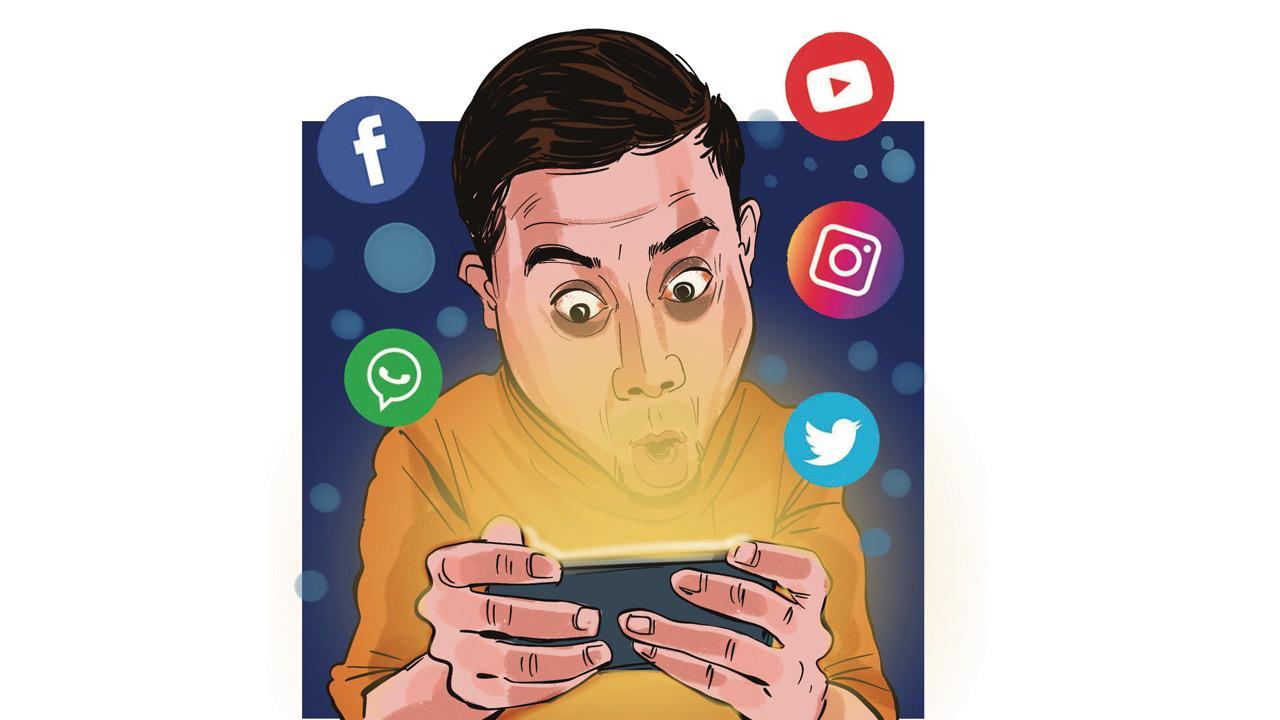One of the dangerous fall-outs of Facebook is, it makes each of us more and more fake by the day.

Illustration/Uday Mohite
When did you last spend one hour straight, talking in person to a family member, friend, neighbour or relative? Uninterrupted by TV, phones or social media, in what is called “deep listening” mode, as in really focussing on what they are saying, sensitive to the emotions they are experiencing? Who may really need your comforting words, a hug (even with masks), or feel great joy if you just held their hands warmly? Who, especially in the Covid-19 era, may be depressed, or unable to accomplish simple daily tasks, or considering suicide, about which you may have no clue?
We are a generation deeply afflicted with a Stage 4 cancer called Facebookitis—here used as a generic term for all social media, also including Facebook, Twitter, Instagram, WhatsApp, YouTube, TikTok and more. Facebook and social media are as useful and life-saving, as they are addictive and downright unhealthy and dangerous for our physical and mental health. This is highlighted in the documentary, The Social Dilemma by Jeff Orlowski (2020), even more relevant in the post-COVID era, which my friend Peter Griffin reminded me about recently. The film is on YouTube for free till end-September, and also on Netflix. “Everything you are doing online is being watched and tracked. Every action carefully monitored and recorded,” says one of the people who helped create social media. It has created a generation of
anxious, depressed, polarised people and, in an era of fake news, internet lynch mobs and people with “less control of who we are and what we believe in,” says an expert in the film.
One of the dangerous fall-outs of Facebook is, it makes each of us more and more fake by the day. It makes a mockery of our emotions. Everyone who wants to limit the time they spend on social media hardly reads posts fully; mostly we just skim and scatter emojis like chaff in the wind—like, love, care, laugh, sad, angry. So, in the space of a single minute, we have lurched through the full gamut of emojis. Responded to someone’s wedding (Shaadi mubarak! Party kab hogi?), to someone whose father passed away following a heart attack (Heartfelt sympathies. May his soul rest in peace), to your school friend whose daughter just graduated in the US (Congratulations to Neha and family, we’re proud of you!), to a friend whose mother has Alzheimer’s and when she brings lunch, asks, “Who are you? Why are you poisoning me?” (too complicated for words, sad emoji lagao, chalo what’s next?), to someone swimming with their dog on Juhu beach (Cuuutie!), to some filmmaker ecstatic because his film got selected at the Indian Film Festival of Srebenica or some such (heart emoji). A friend has tagged you seeking a ‘furrever home’ for a darling rescued kitten that’s “dewormed, vaccinated, fun and she loves to talk” (heart emoji). Uff! The moment you ‘love’ it, those greedy algorithms waiting in the wings shove in your face the video of the inseparable friendship between a kitten and a pup—and fusss! Two hours have gone by just looking at cat and dog videos.
Not only do Facebook and social media disrupt your sleep, but when you’re up at really weird hours of the morning, liking, loving, laughing at others’ posts, the reply comes in an instant—thank you, or a return care emoji. Bloody hell, they are all up and active on Facebook too. And before you know it, the night is gone. Of course, we all know that disrupted sleep patterns play havoc with our physical and mental health, emotional stability, concentration and memory. Facebookitis is possibly the most widespread disease after COVID-19 or perhaps even surpassing it, but because it is a silent, under-monitored disease, creating an exponentially growing generation of living dead zombies, few have paid attention to its treatment, rehabilitation, ‘vaccines’ and digital detox, as it deserves. Is there any adult left on the planet who is daily fast asleep by 10 pm?
Meenakshi Shedde is India and South Asia Delegate to the Berlin International Film Festival, National Award-winning critic, curator to festivals worldwide and journalist.
Reach her at meenakshi.shedde@mid-day.com
 Subscribe today by clicking the link and stay updated with the latest news!" Click here!
Subscribe today by clicking the link and stay updated with the latest news!" Click here!







